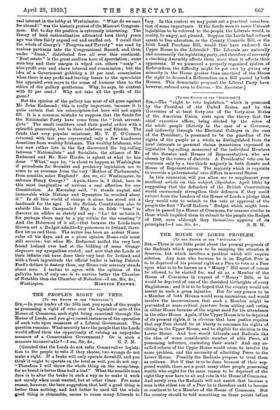[To THE EDITOR OF THE "SPECTATOR."]
SIR,—The "right to veto legislation" which is possessed by the President of the United States, and by the Governors of at least forty-one of the forty-nine States of the American Union, rests upon the theory that the chief executive officer, being elected by the votes of the whole people (directly in the case of a Governor, and indirectly through the Electoral Colleges in the case of the President), is presumed to be the guardian of the rights of the people as a whole, as distinguished from the local interests or personal claims (sometimes expressed in legislative log-rolling measures) of the individual Members of the Senates and Houses of Representatives, who are chosen by the voters of districts. A Presidential veto can be overcome only by a two-thirds majority in both Senate and House of Representatives. The majority which is requisite to override a gubernatorial veto differs in several States.
In this connexion, will you allow me to supplement your excellent article on this subject (Spectator, April lGth) by suggesting that the defenders of the British Constitution would enormously strengthen their defences if they could extract from the Leaders of the House of Lords a pledge that they would vote to submit to the veto or approval of the people the first " Tariff Reform " Budget which might here- after be passed by a House of Commons, for reasons similar to those which impelled them to submit to the people the Budget of 1909, even although they themselves approve of its














































 Previous page
Previous page